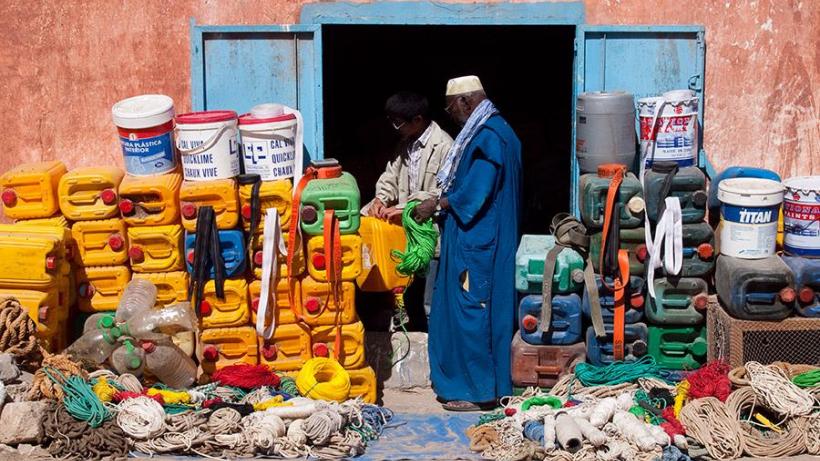
Brexit: Why Africa will lose a voice in Brussels but gain the best of both worlds
The recent British referendum results have unleashed considerable panic and anxiety both in and out of Europe. Olu Fasan explores what a British exit from the EU could mean for African trading partnerships.
The world has talked about little else since Britain voted in a referendum on June 23 to leave the European Union (EU). Everyone, it seems, is transfixed by the referendum result. So, why has Brexit ha such a gripping effect? I suggest two main reasons. First, Europe and Britain are jointly so pivotal to global prosperity that any rupture in their relationship is bound to unleash world-wide anxieties. Second, Britain is effectively the voice of many countries outside Europe in the opaque and labyrinthine world of Brussels politics and policy-making. Thus, for these countries, Brexit would mean the loss of a critical voice and ally within Europe. Although the latter reason, particularly in the context of Africa, is the focus of this piece, the first also carries some implications for Africa.

Nouadhibou market
Image Credit: Evgeni Zotov
Brexit, economic prosperity and spillovers
History teaches us that the economic prosperity of Europe is inextricably linked to political stability and peace on the continent. A prosperous Europe is a linchpin of the world economy. In the 19th century, Europe, led by Britain, dominated the global economy and spread prosperity across the world. It was responsible, for instance, for creating the “golden era” of free trade and global finance. But two devastating wars in the 20th century reduced the continent to an economic wasteland. Yet, barely two decades after the Second World War, Europe bounced back spectacularly, and, today, has a GDP almost equalling that of the United States[1].
Of course, the US helped to kick-start Europe’s post-war economic recovery, with the Marshall Plan and the associated European Payments Union, which helped to facilitate trade and payments between the hitherto autarchic European nations. However, while America’s support was critical, Europe’s post-war economic progress was also due, in no small measure, to European unity, underpinned by political and economic cooperation between the previously warring or divided nations. This was the context in which the EU was awarded the Nobel Peace Prize in 2012.
Brexit is, in this respect, an epochal event because, as President Obama said, it raises significant questions about the future of European integration. This is partly because there is a causal link between stable political relations among nations and economic integration[2]. Nations that enjoy political cooperation tend to trade more, and vice versa. Brexit constitutes a political divorce between Britain and Europe, which raises concerns about whether it could lead to a weakening of economic cooperation between Britain and Europe. This is why the world’s political and economic leaders are united in urging the UK and the EU to transit to a post-Brexit relationship that is based on strong economic ties within the single market. Failure to make this transition or to do so speedily without prolonged or fractious negotiations would create huge uncertainty for businesses, and have serious economic consequences for Britain, Europe and the world.
Of course, as the saying goes, when elephants fight, it is the grass that suffers. Economic recession in Europe or the West will have serious adverse effects on resource-based African economies. This is because monetary or fiscal spillovers from the developed economies transmit through trade and commodity price channels. Indeed, as an African Development Bank study shows, a percentage point decline in eurozone real GDP growth could lead to 0.6% percentage point decline in output growth in oil-dependent states. Brexit anxiety over political and economic instability in Europe and spillovers risks to the wider world thus explains the global fixation on Britain’s referendum result.
Britain as the voice of Africa and other third-countries in Europe
Brexit is epochal for another important, albeit less obvious, reason: it would deny many countries an effective voice in Brussels. The US Secretary of State, John Kerry, said recently that the US would “miss the UK’s voice within the context of the EU”. The Times newspaper also reported that “The Commonwealth was desperate for Britain to stay in Europe to be its voice in Brussels”.
Africa must continue to engage actively with the EU and fill any void that Brexit may create.
The same is true for African countries. Britain’s presence at the EU table is valuable to many non-EU countries in two respects. First, without Britain, ‘third countries’, non-EU countries with significant trade links to the EU, risk losing their greatest champion of free trade within the EU. Second, more than any other EU member state, Britain is strongly pro-development and particularly pro-Africa.
Take the pro-market point first. EU countries are traditionally divided into two blocs. The first is the Northern liberals, and the second the Southern or “Club Med” protectionists. The first group, led by the UK, is, as its name implies, consistently pro-free markets. As the Financial Times said recently: “The UK has consistently been a voice for liberal economics within Europe”, adding: “Without Britain at the table, the EU is much more likely to move towards protectionism”. Brexit will strip the Northern liberals of their strongest intellectual and political force for economic openness, and probably tip the balance of power within the EU away from the pro-market group. This would deny third countries, such as African nations, which would benefit from a less protectionist EU, a key voice at the table.
Then, there is the wider development agenda, of which Britain is arguably the strongest advocate in Brussels. For instance, the UK is the only large EU member state that has so far met the UN foreign aid target of 0.7% of gross national income (GNI)[3]. Britain has also been pressuring other EU countries to meet the target; Brexit will ease that pressure. Furthermore, the UK was the chief demandeur for the reform of the Common Agricultural Policy (CAP), which distorts prices and disadvantages African farm exports.
Of course, other EU member states care about Africa but, often, protectionist instincts and domestic politics stand in the way as can be seen, for instance, from some member states’ resistance to far-reaching CAP reform. By contrast, the UK sees a strong link between trade and Africa’s development, and was always concerned by EU measures that could limit African exports. For instance, Britain was keen that African countries which lost their trade preferences after concluding Economic Partnership Agreements (EPAs) were compensated by the EU. The UK was also the strongest advocate of the WTO Least Developed Country (LDC) services waiver, which allows preferential treatment for services and service suppliers from LDCs. Britain pushed hard to influence EU’s negotiating position and European Commission’s negotiating approach on the issue. And once the waiver was approved at the 8th WTO Ministerial Conference in 2011, Britain led the drive in Brussels for its implementation amid nitpicking over detail by some member states.
The best of both worlds
The above suggests that Brexit would deny Africa a strong voice and ally in Brussels. Yet there may still be hope that Brexit will not be a disaster for Africa. Indeed, it could offer continent the best of both worlds: the opportunity to trade with the world’s largest single market, the EU, and an opportunity for greater trade with an open post-Brexit Britain. Undoubtedly, Africa must continue to engage actively with the EU and fill any void that Brexit may create. To this end, African countries should ratify the EPAs, which would cement their economic ties with the EU. However, Africa must also take advantage of the opportunity presented by Brexit to engage with a pro-free trade and pro-development Britain. African countries should seek trade and investment agreements with a post-Brexit global-facing Britain that is ready and eager to strike trade deals with as many countries as possible. A post-Brexit Britain that is no longer part of the CAP could, for instance, create new markets for Africa’s agricultural exports.
There is, of course, the Commonwealth dimension. A recent study by the Commonwealth Secretariat suggests that there is a ‘Commonwealth effect’ that boosts bilateral trade and investment between Commonwealth countries. But the study also shows that Commonwealth African countries now trade less with the three Commonwealth countries in EU, namely the UK, Cyprus and Malta, than they did over a decade ago. For instance, in 2000, 40% of Commonwealth African countries’ intra-Commonwealth exports went to the three countries. In 2013, this dropped significantly to 18%. One possible explanation for this decline is that EU trade rules reduced Commonwealth African exports to the three EU Commonwealth members. Arguably, with a post-Brexit Britain that is no longer subject to EU trade rules as regards third countries, the ‘Commonwealth effect’ or trade advantage will play a more significant role in influencing trade and investment between the UK and other Commonwealth countries, including the African ones.
Indeed, a deeper trade with Britain and a continuing and even stronger trade with the EU may be a consequence of Brexit for Africa. So, while Brexit will deny Africa a key voice in Brussels, it opens a new vista for the continent. Africa may, indeed, have the best of both worlds.
[1] The EU’s GDP in 2015 was $16,220,370 compared with US’s $17,947,000. See “Report for Selected Country Groups and Subject”, World Economic Outlook, IMF, April 2016.
[2] Peace and political stability are often listed in the literature as one of the dynamic effects of economic integration. See, e.g., Fanny Coulomb (2004) Economic Theories of Peace and War, Routledge.
[3] The only other EU countries that met the target are Sweden, Luxembourg and Denmark.

